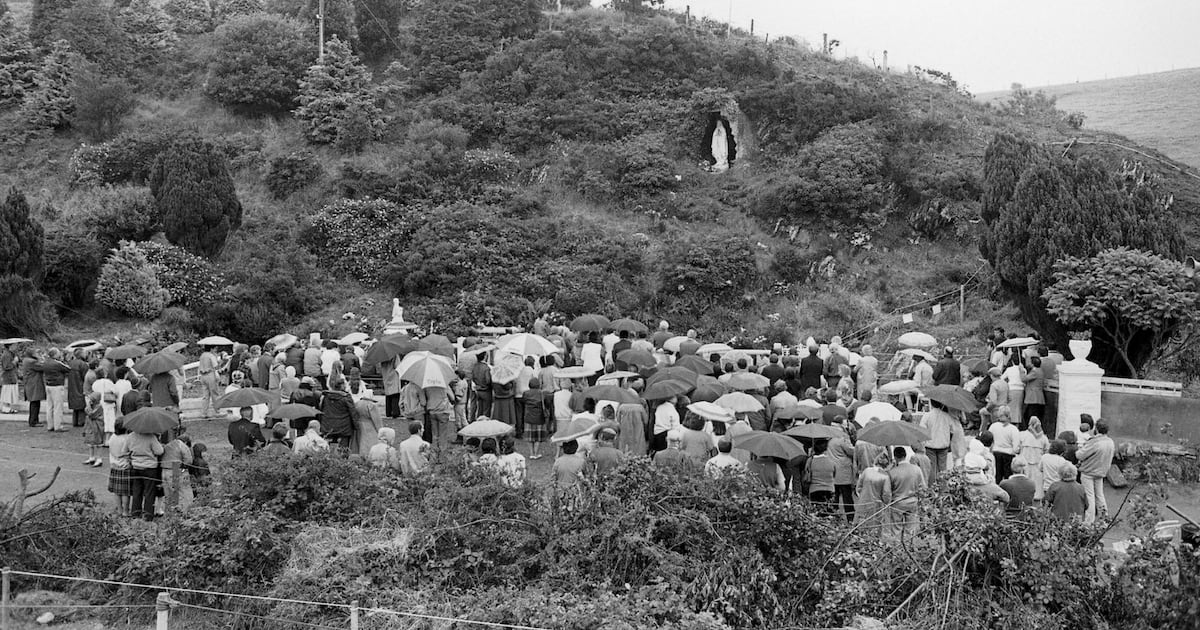Politics
Ballinspittle Reflects on the 1985 “Moving Statue” Phenomenon

On July 22, 1985, the small village of Ballinspittle in County Cork became the epicenter of a remarkable phenomenon when a local teenager, Claire O’Mahony, claimed to have witnessed the statue of Our Lady move at a grotto near Sheehy’s Cross. What began as a personal experience quickly transformed into a national spectacle, drawing thousands of visitors to the area, eager to witness the extraordinary event themselves.
The initial sighting occurred shortly after 10 p.m. during a family outing. O’Mahony’s announcement sparked a summer filled with reports of similar occurrences across Ireland, with at least 30 additional sightings of statues appearing to move. By August 15, the Feast of the Assumption, an estimated 15,000 people flooded Ballinspittle, seeking solace or spectacle, as media outlets from around the world descended to cover the story.
Local journalists, including those from ERI, a pirate radio station in Cork, rushed to report on the phenomenon. The grotto, a natural amphitheater with the statue elevated on a platform surrounded by twinkling lights, became a site of pilgrimage. Many visitors reported feeling a profound sense of spirituality, while others were caught up in the excitement of the unusual event.
As the media frenzy continued, psychological experts weighed in. Dr. Anthony Clare, a psychiatrist, suggested that the sightings often occurred late in the evening and were reported primarily by women with deep religious devotion. He posited that the phenomenon might reflect societal tensions, such as the high unemployment rate of 17 percent in Ireland at the time and the existential anxieties of the Cold War era.
Despite the fervor surrounding the statue, not everyone embraced the phenomenon. Some locals expressed skepticism, while others organized protests against what they perceived as idolatry. In a notable incident, the statue was vandalized by protestors led by Robert Draper, who was later convicted for his actions and served six months in prison. Following the vandalism, the statue was repaired, and the grotto remained a site of interest for many.
Today, the grotto continues to attract visitors, though the atmosphere has changed. A caretaker’s hut stands nearby, albeit devoid of activity, and the site features numerous rosaries hanging on a rail. A local resident mentioned hearing the rosary being recited from the grotto, amplified through loudspeakers, providing a contrast to the digital noise of modern life.
While the fervor of the 1985 sightings may have faded, the legacy of the moving statue remains etched in the memories of those who experienced it. The juxtaposition of faith, social issues, and media attention during that summer illustrates a unique moment in Irish history.
As visitors to Ballinspittle now seek both coffee and connection, the moving statue serves as a reminder of a time when belief and curiosity converged in the quiet streets of this village, creating a tapestry of community and faith that resonates even decades later.
-

 Top Stories3 months ago
Top Stories3 months agoTributes Surge for 9-Year-Old Leon Briody After Cancer Battle
-

 Entertainment4 months ago
Entertainment4 months agoAimee Osbourne Joins Family for Emotional Tribute to Ozzy
-

 Politics4 months ago
Politics4 months agoDanny Healy-Rae Considers Complaint After Altercation with Garda
-

 Top Stories4 months ago
Top Stories4 months agoIreland Enjoys Summer Heat as Hurricane Erin Approaches Atlantic
-

 World5 months ago
World5 months agoHawaii Commemorates 80 Years Since Hiroshima Bombing with Ceremony
-

 Top Stories3 months ago
Top Stories3 months agoNewcastle West Woman Patricia Foley Found Safe After Urgent Search
-

 Top Stories5 months ago
Top Stories5 months agoFianna Fáil TDs Urgently Consider Maire Geoghegan-Quinn for Presidency
-

 World5 months ago
World5 months agoCouple Convicted of Murdering Two-Year-Old Grandson in Wales
-

 World5 months ago
World5 months agoGaza Aid Distribution Tragedy: 20 Killed Amid Ongoing Violence
-

 World5 months ago
World5 months agoAristocrat Constance Marten and Partner Convicted of Infant Murder
-

 Top Stories4 months ago
Top Stories4 months agoClimbing Errigal: A Must-Do Summer Adventure in Donegal
-

 Top Stories4 months ago
Top Stories4 months agoHike Donegal’s Errigal Mountain NOW for Unforgettable Summer Views









